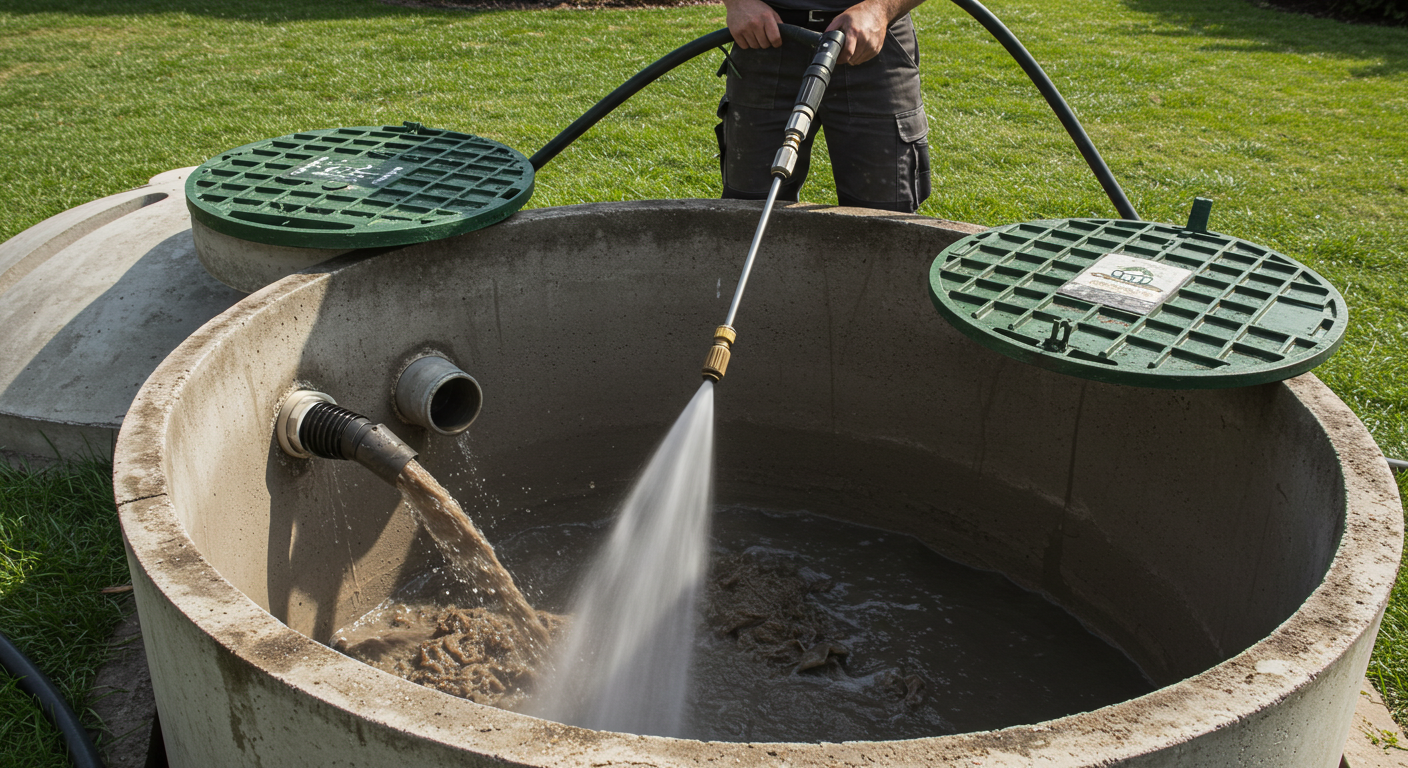How Do You Clean a Septic Tank?
Cleaning a septic tank is an important job that helps your whole system work well. Over time, waste builds up inside the tank and needs to be removed. A professional will first find where your tank is buried. Once it’s located, they open the lid carefully and check for any signs of trouble inside. This is where septic tank cleaning begins. The process starts by measuring the levels of waste to see how full the tank is.
Next, they use a large vacuum hose to start septic tank pumping. The hose is connected to a special truck that pulls all the waste out of the tank. After pumping, the inside of the tank is cleaned. The baffle filter is rinsed, and sometimes the walls are sprayed down to remove any leftover sludge. This full septic tank cleaning keeps the system from overflowing and helps everything flow better inside your pipes. It also protects your yard and your home from bad smells and backups.

Septic Tank Pumping vs. Deep Septic Cleaning
Septic tank pumping is when all the waste is removed from inside the tank. It’s a fast and simple way to stop clogs and bad smells. Most homes need pumping every 3 to 5 years. When done on time, it helps keep the system running without problems. Pumping removes the solids, liquids, and floating scum from the tank to make space again.
Septic tank cleaning goes one step further. It includes cleaning filters, rinsing the walls, and making sure the tank is fully clean inside. This is useful if you haven’t had your tank serviced in a long time or if the system is showing signs of trouble. A full cleaning helps the tank last longer and prevents future problems with your drains or yard.
How Often Should You Clean or Pump a Septic Tank?
Most homes should schedule septic tank pumping every 3 to 5 years. But how often you need it depends on the size of your tank and how many people live in your home. If you use a lot of water or have a small tank, you may need to pump it more often. Skipping this step can lead to big problems, like slow drains or even waste backing up into your home.
Septic tank cleaning might not be needed as often, but it’s still important. Some homes may need it every few years, especially if the tank is old or not working properly. Cleaning keeps your tank fresh and removes built-up waste that pumping might miss. A clean tank is a healthy tank, and regular care saves you money in the long run.
How to Care for Your Septic Tank After Cleaning
- Get your tank checked every few years
- Don’t flush wipes, diapers, or grease
- Use less water when possible
- Don’t park or build over the tank or drain field
- Be gentle with cleaning chemicals
Signs Your Septic Tank Needs Cleaning
There are some easy signs that tell you it’s time for septic tank pumping or septic tank cleaning. If your toilets are flushing slowly or your sinks drain too slowly, the tank may be too full. Bad smells in your yard or inside your house can also mean the tank is overdue for service. You may also notice wet patches of grass or really green areas above the tank—that means it’s leaking.
If it’s been a long time since your last septic tank pumping, or you don’t remember when it was done, it’s best to call a professional. Waiting too long can lead to messes, costly repairs, and even damage to your yard. Regular septic tank cleaning can stop these problems before they start.
Work With a Trusted Septic Tank Professional
Cleaning and pumping a septic tank is not something you should do on your own. It needs the right tools and safety steps. A trained professional knows how to handle waste, check for signs of trouble, and make sure the tank is fully clean. They also know the best time to return for your next septic tank pumping.
Hiring a pro for septic tank cleaning means the job is done right. It helps your whole system stay strong and work better for years to come. When your tank is cleaned on time, your home stays safe, your pipes stay clear, and your yard stays clean. Always keep a record of your last pumping so you don’t forget the next one.
You may also like:
-
How Long Does a Septic System Last?
-
How Often to Pump Septic Tank for a Family of 2
-
How Do You Clean a Septic Tank?
-
Do Septic Tanks Have to Be Emptied?
-
How Often Should Septic Systems Be Pumped?
-
How Often Do Septic Tanks Need To Be Replaced?
-
Can a Collapsed Septic Tank Make Your Water Brown?
-
How to Find Your Septic Tank
